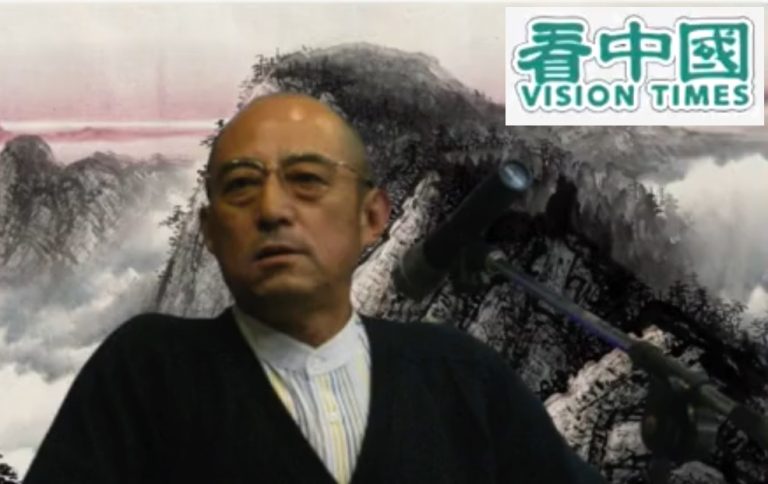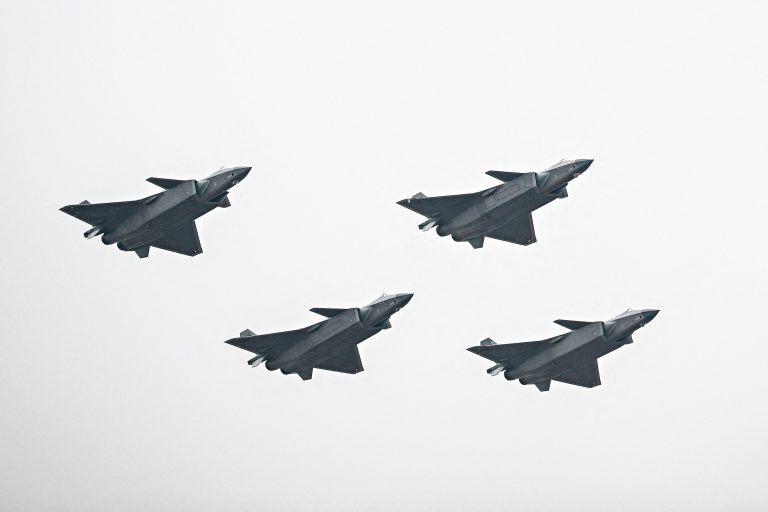By Li Jingru, Vision Times Staff
Following Taiwan’s recent presidential election that saw the victory of pro-independence candidate William Lai Ching-te, Beijing has changed its approach to influence the island’s democratic government, Australia-based Chinese jurist and dissident Yuan Hongbing has warned.
Yuan, an exile who has connections with elite political circles in the Chinese Communist Party (CCP), spoke with Vision Times (full interview in Chinese) about how the regime, which claims Taiwan as a part of Communist China, is attempting the “total subversion” of the Republic of China (ROC) Legislative Yuan, Taiwan’s parliament.
Taiwan’s official name is the ROC because its government used to run all of China before it lost the mainland to the communist armies and reestablished itself across the Taiwan Strait.
Though he won with around 5.5 million votes, Lai, whose Democratic Progressive Party (DPP) advocates a separate national identity and eventual statehood for Taiwan, received less than half of the total votes.
- Taiwan Voters Reject CCP’s ‘Reunification’ Agenda in 2024 Presidential Election
- CCP Sends 39 Aircraft and Vessels to Harass Taiwan During Talks With Washington
- US Navy Sends First Warship Through Taiwan Strait Post-Election
Success
You are now signed up for our newsletter
Success
Check your email to complete sign up
Meanwhile, the opposition Chinese Nationalist Party (Kuomintang), which hopes for warmer cross-strait relations, received about 4.5 million votes for its candidate, Hou Yu-ih, and gained more seats in the Legislative Yuan than the DPP, though no party forms a majority.
On Feb. 1, Beijing-friendly Kuomintang legislator Han Kuo-yu was elected speaker of the Yuan, gaining 54 votes to the DPP incumbent’s 51. Lawmakers from the Taiwan People’s Party (TPP), whose candidate Ko Wen-je received 25 percent of the popular vote in the Jan. 13 presidential election, abstained.
Han’s election to the speaker position has sparked concern among Taiwanese that he will curry favor with the CCP, such as by taking the unprecedented action of visiting mainland China.
A ‘direct threat to Taiwan’s national security’
Yuan believes that Han taking the speakership is a “direct threat to Taiwan’s national security.”
Communist China sees Taiwan as part of its own territory, as Beijing considers the ROC an illegitimate remnant state to be absorbed by the mainland regime.
Despite having fought bitterly against the CCP for decades on the mainland and during the Cold War, the Kuomintang has in recent years shifted to a more conciliatory stance, with many in the party actively courting the communists and falling for their “united front” subversion tactics.
According to Yuan, the Communist Party’s main goal in the 2024 Taiwan election was to have the Kuomintang triumph with the help of the TPP, which garnered strong support among Taiwanese youth.
- ‘A Triumph of Traditional Chinese Culture’: Shen Yun Enchants Audiences in Japan
- Tuvalu’s Pro-Taiwan Prime Minister Loses Seat in Election Putting Security Treaty with Australia at Risk
“However, due to the extremely ambitious political opportunism of Ko Wen-je, the People’s Party leader, blue-white cooperation collapsed. So, the DPP candidate, Lai Ching-te, became the next president of Taiwan,” Yuan said. “The CCP’s conspiracy to manipulate the Taiwan election has suffered a major setback.”
In Taiwanese politics, the blue camp refers to the KMT and its allies, green denotes the DPP and other like-minded parties, and the recently emergent “white” for Ko’s TPP.
Yuan said that per information leaked by his contacts in the CCP leadership, the regime’s failure to achieve a favorable outcome in the election led to Song Tao — the head of the Party’s Taiwan Affairs Office — receiving a severe reprimand from CCP General Secretary Xi Jinping.
Political rumors and “leaks” surrounding the Communist Chinese leadership are common, and often serve the ends of differing factions within the Party. As such, they serve as useful clues concerning the dynamics of elite struggle in the regime.
Two new directives for ‘united front’ work
According to Yuan Hongbing, the CCP identified Han Kuo-yu and fellow KMT legislator Fu Kun-chi as being likely contenders for the top positions in the Legislative Yuan and the Kuomintang’s caucus. This intelligence prompted Xi Jinping to quickly issue two new directives for the Taiwan Affairs Office (TAO).
In addition to Song Tao, Wang Huning, a close political ally of Xi, holds a leadership position in the TAO.
“Xi instructed them to seize the opportunity of Han Kuo-yu and Fu Kun-chi” being appointed to “launch a strategic offensive against Taiwan by seizing the commanding heights of the Legislative Yuan.” This would “tear open a breakthrough in Taiwan’s political structure” and “rapidly create favorable conditions for ensuring the success of reunification,” Yuan Hongbing said.
- What Are the Aims of the CCP’s Constant Naval Presence in the Taiwan Strait?
- Kim Jong Un Publicly Suggests Failure of North Korea’s Rationing System
In the strategy of the CCP and other communist regimes, “united front” operations are used to subvert non-communist organizations and governments. During the Chinese civil war and World War II, the CCP used “united front work” to great effect in undermining the ROC government in mainland China, covertly expanding the communists’ forces, working with the Japanese invaders to inflict massive defeats on the Kuomintang, and eventually crush its military.
In 1949, the communists established their People’s Republic of China (PRC), and declared the ROC a vanquished government, while refocusing “united front” efforts on Taiwan and other countries.
According to Yuan Hongbing, Xi noted that while the Legislative Yuan was a governing body of the ROC and could not be recognized by the CCP through direct interactions with it or its members, the Party’s agents could still engage with the Yuan under cover, namely under the auspices of the Chinese People’s Political Consultative Conference (CPPCC).
The CPPCC is an organization that gathers various civil groups nominally outside the Communist Party, but which is in fact controlled by it.
Per this directive, Wang Huning, who chairs the National Committee of the CPPCC, would take the role of “coordinating” and “commanding” the influence operations against Taiwan, alongside Song and his TAO.
‘Seizing the high ground’
“After receiving instructions from Xi Jinping, the CCP’s Taiwan Affairs Office quickly took action and submitted a document titled ‘Key Points of United Front Strategy for Seizing the High Ground of the Legislative Yuan’ to Xi Jinping and Wang Huning on Jan. 27,” Yuan Hongbing continued.
“This document has now been sent to the responsible leaders of the United Front Work Departments, Political Consultative Conferences, and local TAO branches at all levels of the CCP’s provinces, municipalities, and autonomous regions,” he said, citing reports passed from his contacts by word of mouth.
Going by what the insiders told him, Yuan summarized the strategy for “seizing the high ground” as containing four main points:
First, the CCP will urge Han Kuo-yu and Fu Kun-chi using various means to complicate Taiwan’s ongoing efforts to build a submarine fleet, such on pretexts of investigating corruption. This will undermine the DPP’s efforts under Lai Ching-te to strengthen the ROC’s military defense.
Second, the document calls to make use of the opportunity to engage with the Legislative Yuan and the Kuomintang caucus on the basis of the so-called “1992 Consensus,” which Han and other Kuomintang politicians have promoted.
The “1992 Consensus” refers to an unofficial understanding between the CCP and the Kuomintang, reached in 1992.
Ironically, there is in fact no real consensus about what the “Consensus” is; the Kuomintang says that the agreement was for both sides of the Taiwan Strait to engage each other on friendly terms, while Beijing claims that the Consensus amounts to the Kuomintang recognizing the communist PRC.
Using the “1992 Consensus rhetoric,” Yuan said, the CCP will plan to try to make inroads via the Taiwanese legislature and “establish various platforms for political, economic, and cultural exchanges between the two sides of the strait, gradually making the ‘1992 Consensus’ of the two parties the dominant ideology in Taiwan’s society for viewing cross-strait relations.”
“The third point is to urge Han Kuo-yu, Fu Kun-chi, and the Kuomintang caucus in the Legislative Yuan through specific individuals to propose bills on parliamentary reform in the name of granting the Legislative Yuan investigative powers, presidential questioning rights, and anti-Taiwan independence laws. Even if these bills are difficult to pass for the time being, they are enough to cause confusion or even a shutdown of the Legislative Yuan, effectively reducing the efficiency of the DPP administration, namely President Lai Ching-te’s governing efficiency,” Yuan Hongbing said.
The final point is “to urge Han Kuo-yu, after he takes the lead of the Taiwan Democracy Foundation, through specific individuals to closely engage with organizations such as the Chinese Unity Promotion Association formed by overseas Chinese in various countries, aiming to invite Chinese and overseas Chinese who seek unification from around the world to visit Taiwan in the name of the Legislative Yuan and the Kuomintang caucus, thereby forming a global wave of anti-independence and pro-unification.”
“I believe that such a document is sufficient to demonstrate the unprecedented danger faced by free Taiwan.”
Yuan Hongbing: Leading figures ‘betraying Taiwan to the CCP’
Yuan believes that Han Kuo-yu and Fu Kun-chi represent the CCP’s interests in the Kuomintang opposition.
“A quick online search, whether looking at their ideological beliefs to their concrete actions, is sufficient to demonstrate that Han Kuo-yu, Fu Kun-chi, and others are undisputed political agents who act on behalf of the CCP,” Yuan told Vision Times.
He noted that Han Kuo-yu, who in 2020 was the Kuomintang’s presidential candidate and lost badly to current president Tsai Ing-wen of the DPP, received his university degree in Beijing, and even visited the Liaison Office of the PRC Central People’s Government in Hong Kong.
“What they are betraying to the CCP is the sovereignty of the people of free Taiwan, who are independent of the CCP’s tyranny, and the rights of the free people of Taiwan to determine their own fate and way of life,” Yuan said.













